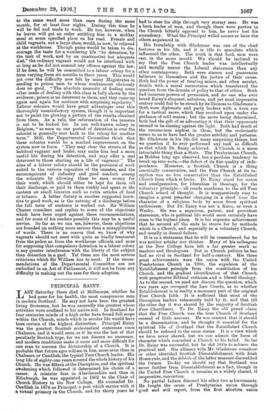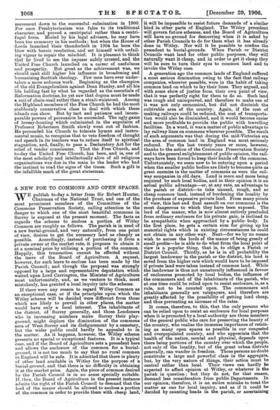PRINCIPAL RAINY. T4 AST Saturday there died at Melbourne, whither he
had gone for his health, the most conspicuous man in modern Scotland. He may not have been the greatest living Scotsman, but he was assuredly the greatest whose activities were confined to his native soil. In Scotland for four centuries minds of a high order have found full scope within the Church, minds which in secular life would have been certain of the highest distinction. Principla Rainy was the greatest Scottish ecclesiastical statesman since Chalmers, and it would seem as if he was the last of that peculiarly Scottish type, for we can discern no successor, and modern conditions make it more and more difficult for one man to assume the dictatorship of a Church. It is probable that future ages will see in him, more even than in Chalmers or Candlish, the typical Free Church leader. His long life of eighty-one years covered the whole history of his Ohuteh. He was fifteen at the Disruption, and the spiritual alaakening which followed it determined his choice of a career. A minister first in Aberdeenshire and then in Edinburgh, he was appointed. in 1862 to the Chair of Church History in the New College. He succeeded Dr. OandliSh in 1874 as Principal, a post which carries with it Si Virtual primacy in the Church, and for thirty years he had'to steer his ship through very stormy seas. He was a born leader of men, and though there were parties in the Church bitterly opposed. to him, he never lost his ascendency. What the Principal willed sooner or later the others acquiesced in.
His friendship with Gladstone was one of the chief features in his life, and. it is idle to speculate which influenced the other. The truth is that both men were cast in the same mould. We should be inclined to say that the Free Church leader was intellectually and Morally nearer the Liberal statesman than any other contemporary. Both were sincere and passionate believers in themselves and the justice of their cause. Both had the power of treating minor, and often secular, details with a moral earnestness which transferred the question from the demean of policy to that of ethics. Both had immense powers of persuasion, and no one who ever heard Rainy's eloquent, nebulous, and yet most impressive oratory could fail to be struck by its likeness to Gladstone's. Both were diplomats and party leaders with a keen eye for a tactical move, which they resolved upon under the guidance of cold reason; but the move being determined, both had the gift of so advocating it that their opponents seemed to be sinning against the light. Both had much of the unconscious sophist in them, but the ecclesiastic seems to us to have had the greater subtlety and patience. Mr. Gladstone in his life did. many surprising things, but we question if he ever performed any task so difficult as that which Dr. Rainy achieved. A Church is a more intractable thing than a State. The Presbyterian Church, as Hobbes long ago observed, has a perilous tendency to break up into sects,—the defect of its fine quality of inde- pendence. Moreover, a Scottish Church is a thing essentially conservative, and the Free Church at its in- ception was no less conservative than the Established Church from which it broke. Di. Rainy stood for union and amalgamation, for liberalism in theology, for the voluntary principle,— all creeds anathema to the old Free Church school of thought. It is comparatively easy to imagine a great preacher changing in a short time the character of a religious body by some fierce spiritual enthusiasm. But Dr. Rainy was not a Knox, or even a Wesley. He was a sagacious, patient, and provident statesman, who in political life would most certainly have risen to the highest place. It is his supreme achievement that he secured all the ends he strove for by methods which in a Church, and. especially in a voluntary Church, end. usually in dismal failure. It is as a statesman that be will be remembered, for he was neither scholar not thinker. Many of his colleagues at the New College have left a far greater mark as teachers and theologians. But in Church politics he has bad. no rival in Scotland for half-a-century. His three great achievements were the union with the United Presbyterian Church in 1900, the expulsion of the Establishment principle from the constitution of his Church, and the gradual identification of that Church with progressive Biblical criticism and a liberal theology. As to the second, we need not discuss the question, which two years ago occupied the Law Courts, as to whether Establishment is in reality a necessary part of the original Free Church faith. It is sufficient that most of the Disruption leaders vehemently held by it, and that till the other day it was shared by the majority of Scottish Free Churchmen. To Dr. Rainy the old proud claim that the Free Church was the true Church of Scotland seemed of little account. He was content that it should. be a denomination, and he thought it essential for the spiritual life of Seotland that the Established Church should be reduced to the same status. It is a view which we have never shared, but we can admire the force of character which converted a Church to his belief. So far Dr. Rainy was successful, but he did little to achieve the practical end. His alliance with Mr. Gladstone somehow or other identified Scottish Disestablishment with Irish Home-rule, and the &lade of the latter measure discredited the former. To-day we should say that Scotland was never further from Disestablishment as a. fact, though in the United Free Church it remains as a widely shared, if inoperative, conviction. No partial failure dimmed. his other two achievements. He fought the cause of Presbyterian union through geed and evil report, from the first abortive union movement down to the successful. culmination in 1900. For once Presbyterianism was false to its traditional character, and proved a centripetal rather than a centri- fugal force. Misled by his legal advisers, be may have been too summary in his methods ; but when the House of .Lords launched their thunderbolt in 1904 he bore the blow with heroic resolution, and set himself with unfail- ing vigour to repair the mischief. It is pleasant to think that he lived to see the impasse safely crossed, and the United Free Church launched on a career of usefulness and prosperity. But great as the achievement was, we should rank still higher his influence in broadening and humanising Scottish theology. Few men have ever under- taken a more arduous work. Beginning as the champion of the old Evangelicalism against Dean Stanley, and all his life holding fast by what be regarded as the essentials of Reformation doctrine, he yet saw that dogma must be made a suit of chain-mail rather than a strait-waistcoat. Among the Highland members of the Free Church he had the most stubbornly conservative class to deal with which these islands can show. But by tact and patience and incom- parable powers of persuasion he succeeded. The ugly game of heresy-bunting which culminated in the expulsion of Professor Robertson Smith slowly went out of fashion. He persuaded his Church to tolerate hymns and instru- mental music, to recognise that to veto freedom of thought and speech in its teachers was to reduce itself to spiritual stagnation, and, finally, to pass a Declaratory Act for the relief of tender consciences. That the Free Church, and to-day the United Free Church, has been, and is, one of the most scholarly and intellectually alive of all religious organisations was due in the main to the leader who had the instinct to read the signs of the times. Such a gift is the infallible mark of the great statesman.



































 Previous page
Previous page